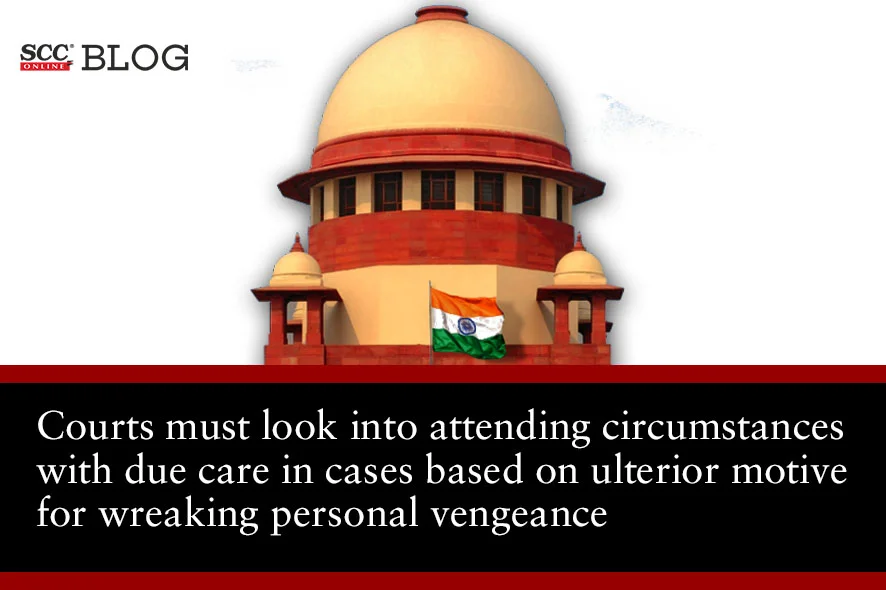Supreme Court: In an appeal filed by the accused against the order passed by the Allahabad High Court, wherein the Court rejected to quash the FIR filed against him for the offence punishable under Section 506 of the Penal Code, 1860 (‘IPC'), the division bench of BR Gavai and JB Pardiwala, JJ. concluded that the FIR dated 11-08-2022 deserves to be quashed, as it is apparent that the State believes that the father-in-law of the accused is a very hardened criminal, the accused who has been implicated in the further statement of the first informant is also a criminal. Thus, the Court set aside the impugned order.
Issue: Whether the FIR should be quashed so far as the accused is concerned?
Analysis:
The Court noted that the accused has not been named in the FIR as one of the accused persons. There is no allegation in the entire FIR against the accused. Further, the statement of the first informant was recorded under Section 161 of the Code of Criminal Procedure, 1973 (‘CrPC') and in the said statement, the name of the accused surfaced.
The Court said that there are many circumstances emerging from the record of the case which indicates that the case on hand is one of false implication. Just because the accused happens to be the son-in-law of a very hardened criminal as alleged, he has also been roped in.
The Court noted that the investigating agency added Sections 147, 148, 149, 195A, 385 and 504 IPC.
The Court noted that the allegation in the FIR is that the accused persons threatened and pressurised the informant to withdraw her first FIR registered for the offences punishable under Sections 376D, 323, 120B, 354A and 452 IPC.
The Court said that there is nothing to indicate that the accused persons threatened the first informant with intent that the first informant gives false evidence before the Court of law. Further, after taking note of Section 195A IPC, the Court said that none of the ingredients to constitute the offence punishable under Section 195A are disclosed, on plain reading of the FIR and the further statement of the first informant including the statement of the so-called eyewitness. To give threat to a person to withdraw a complaint or FIR or settle the dispute would not attract Section 195A of the IPC.
Further, the Court took note of Section 195A CrPC, which indicates that if a witness or any other person receives threats and such threats are administered with an intent to cause that person to give false evidence before the Court, then such witness or person can file a complaint in relation to the offence under Section 195A of the IPC.
Concerning the allegation of extortion, the Court said that nowhere the first informant has stated that out of fear, she paid Rs. 10 Lakh to the accused persons. There is nothing to indicate that there was an actual delivery of possession of property by the person put in fear. In the absence of anything to even remotely suggest that the first informant parted with a particular amount after being put to fear of any injury, no offence under Section 386 of the IPC can be said to have been made out.
Thus, the Court observed that the entire case put up by the first informant on the face of it appears to be concocted and fabricated.
After perusing the FIR, the Court noted that the victim has earlier lodged an FIR for the offences punishable under Sections 376D, 323, 120B, 354A and 452 IPC, and under Sections 7 and 8 of the Protection of Children from Sexual Offences Act, 2012 against father-in-law of the accused. Further, it was alleged that the accused persons had telephonically as well as in person threatened the victim saying that they are the associates of the father-in-law and that if she would not withdraw the said FIR, then she as well as her family members would be killed.
The Court observed that whenever an accused comes before the Court invoking either the inherent powers under Section 482 of the Code of Criminal Procedure,1973 (‘CrPC') or extraordinary jurisdiction under Article 226 of the Constitution to get the FIR or the criminal proceedings quashed essentially on the ground that such proceedings are manifestly frivolous or vexatious or instituted with the ulterior motive for wreaking vengeance, then in such circumstances the Court owes a duty to look into the FIR with care and a little more closely.
The Court said that once the complainant decides to proceed against the accused with an ulterior motive for wreaking personal vengeance, then he would ensure that the FIR/complaint is very well drafted with all the necessary ingredients to constitute the alleged offence. Therefore, in frivolous or vexatious proceedings, the Court owes a duty to look into many other attending circumstances emerging from the record of the case over and above the averments and, if need be, with due care and circumspection try to read in between the lines.
The Court noted that in the present case, there are multiple FIRs that have been registered over a period of time. It is in the background of such circumstances that the registration of multiple FIRs assumes importance, thereby attracting the issue of wreaking vengeance out of private or personal grudge as alleged.
The Court concluded that the FIR dated 11-08-2022 deserves to be quashed, as it is apparent that the State believes that the father-in-law of the accused is a very hardened criminal, his son-in-law i.e., the accused who has been implicated in the further statement of the first informant is also a criminal. Thus, the Court set aside the impugned order.
[Salib v. State of U.P., 2023 SCC OnLine SC 947, Order dated 08-08-2023]











